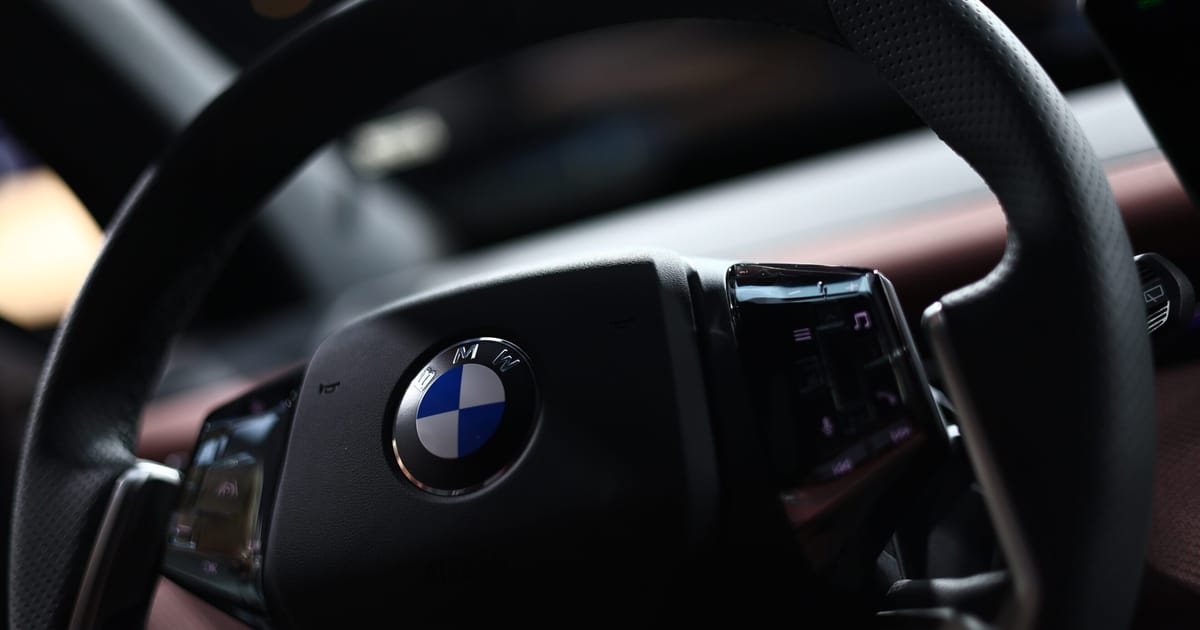BMW CEO Oliver Zipse tells POLITICO the EU should be more flexible on forcing carmakers to go green if it doesn’t want to kill the industry.
AI generated Text-to-speech
The EU is making “a huge mistake” by forcing carmakers to shift to selling only electric vehicles by 2035, BMW CEO Oliver Zipse told POLITICO this week, as he launched his company’s new models, including EVs.
The new all-electric iX3 SUV, he boasted on Friday, has fast charging and 800 kilometers of range, enough to make range anxiety — a common concern among consumers hesitant about buying a battery-powered car — “a thing of the past,” he said.
Just days earlier, he sat down with POLITICO to make his case for why the Commission should further weaken legislation that forbids the sale of any new cars that emit CO2 from 2035 — essential banning the internal combustion engine.
“I think we’re doing ourselves a disservice by choosing an almost arbitrary point in the future where we say all industries have to align themselves with it by then,” he said.
European Commission President Ursula von der Leyen is hosting the next strategic dialogue for the automotive sector on Sept. 12 with the chief executives of Europe’s biggest automakers and suppliers, including Zipse. At the top of their agenda is the 2035 ban.
Industry associations, other automakers and their political benefactors have called for the legislation to be either overturned or severely weakened. The sector has latched onto the idea of “technological neutrality” that would allow alternative fuels to be included in the legislation that would keep the combustion engine alive far past the 2035 deadline.
Automakers argue that biofuels — made with plant matter — and e-fuels — synthetic fuels made with renewable energy and captured CO2 — are cleaner than traditional fossil fuels. However, critics say they are still not as green as EVs and cannot be produced at a large enough scale to be used in passenger cars.
Yet von der Leyen has already promised to add technology neutrality to the legislation following a March industry dialogue and the subsequent Automotive Action Plan that saw the executive cave on this year’s auto emission targets.
Zipse, too, brought up technological openness in his interview with POLITICO. The bloc should allow five drivetrains after 2035, he said: diesel, gasoline, plug-in hybrids, EVs and hydrogen.
BMW and Japanese automaker Toyota have latched onto hydrogen as a potential alternative but so far, the technology has not taken off.
Unlike some of the 2035 legislation’s biggest detractors, including Italian Industry Minister Adolfo Urso and the European People’s Party, Zipse does not want the law to be completely overturned.
Instead, it should be revised to calculate the total carbon emissions of a vehicle rather than mandating zero emissions at the tailpipe, he said.
The question is “how much CO2 is emitted per vehicle, for example, by the battery manufacturer,” he said. This calculation would include emissions along the entire value chain — from battery production to, most crucially, the fuel sources used.
The CEO also took direct aim at the fossil fuel industry, arguing it should also face decarbonization targets.
“It is an absolute absurdity of today’s regulation that fuel manufacturers, the Shells and BPs of this world, have no targets,” he said.
More needs to change beyond the emission targets, however, for the sector to be more competitive, he said, pointing to Germany’s high labor costs. European carmakers are struggling with the shift to EVs, difficulty in selling cars in China and the arrival of Chinese carmakers in Europe, as well as the turmoil caused by Donald Trump’s tariffs.
Germany is still a manufacturing powerhouse, but it has gradually shifted production to cheaper locales in Central Europe and Asia. The problem in Zipse’s mind is worker protections and a disconnect between productivity and wage gains.
“Why do we dictate to people how many hours they are allowed to work? Of course, this is to protect employees, implicitly, that’s clear, but we are so restrictive that we are effectively prohibiting people from working,” he said. “If you want to work 1,000 hours, please work 1,000 hours, and if you want to work 2,000 hours, please work 2,000 hours.”
That stance will put him at odds with worker’s unions, which are already bristling at automaker job cuts, saying the companies failed to adapt fast enough to electric vehicles.
Crossing unions can be dangerous for a CEO. Volkswagen chief Herbert Diess was pushed out in 2022 after high-profile clashes with the IG Metall union over potential job cuts and cost-saving measures he said were needed to shift to EVs.
In a separate interview, Christiane Benner, the head of IG Metall, said German and European jobs must “be safeguarded” primarily by creating local content requirements that would “secure employment for suppliers.”
Russia’s leader caught on hot mic musing about “immortality” with Chinese ruler.
Social media lit a fire under Albania’s tourism surge, leading to a sharp increase in prices.
Under the EU-U.S. trade deal, American cars that meet lower standards could be allowed on European roads, but the political obstacles are formidable.
All of Europe’s carmakers have reported losing millions in profit because of the tariffs, and say they’re not hopeful of getting carveouts for the sector.











